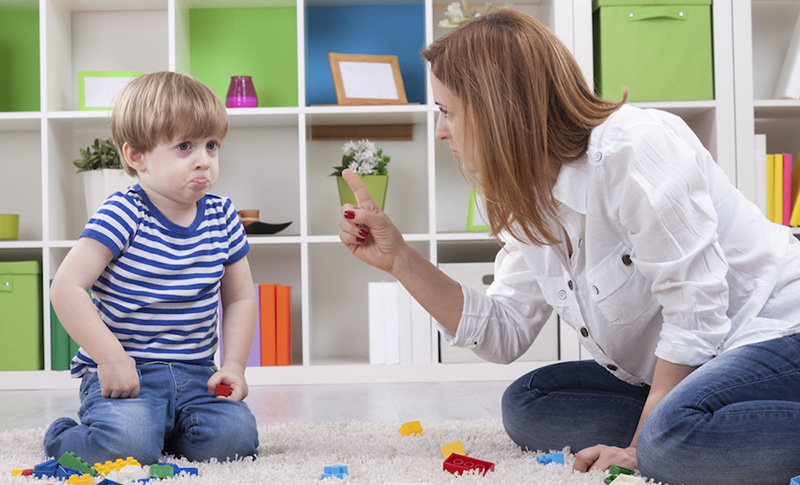Spanking Children Increases Likelihood Of Childhood Defiance And Long-Term Mental Issues
April 26, 2016
If you think that the answer to a disobedient child is a good spanking, think again.
After extensive analysis, researchers from the Universities of Texas and Michigan found that this form of punishment only makes children more likely to be defiant and aggressive.

Credit: Thinkstock
The study, which was published in the April edition of the Journal of Family Psychology, was based on five decades worth of research involving more than 160,000 children. They're calling it the most extensive scientific investigations into the spanking issue.
"Our analysis focuses on what most Americans would recognize as spanking and not on potentially abusive behaviors," lead author Elizabeth Gershoff, an associate professor of human development and family sciences at the University of Texas, said in a statement Monday. "We found that spanking was associated with unintended detrimental outcomes and was not associated with more immediate or long-term compliance, which are parents' intended outcomes when they discipline their children."
In fact, Gershoff and co-author Andrew Grogan-Kaylor, an associate professor at the University of Michigan School of Social Work, found that the more frequently that children are spanked, the higher the risk that those kids will start to defy their parents, become aggressive, experience mental health issues, exhibit anti-social behaviors, and/or develop cognitive difficulties.
As part of their meta-analysis, Gershoff and Grogan-Kaylor looked at the association between spanking (defined for their study as an open-handed smack of a child’s bottom or extremities) and 17 potential detrimental outcomes. They found a significant link between the punishment and 13 of the 17 outcomes, suggesting that spanking ends up doing more harm than good.
"The upshot of the study is that spanking increases the likelihood of a wide variety of undesired outcomes for children," said Grogan-Kaylor. "Spanking thus does the opposite of what parents usually want it to do."
Furthermore, they noted that spanking was associated with the same adverse outcomes in children as physical abuse, and both were nearly similar in terms of outcome strength.
"We as a society think of spanking and physical abuse as distinct behaviors. Yet our research shows that spanking is linked with the same negative child outcomes as abuse, just to a slightly lesser degree," explained Gershoff. "We hope that our study can help educate parents about the potential harms of spanking and prompt them to try positive and non-punitive forms of discipline."
Sources: NCBI, UTNews. (h/t) Redorbit
 Dogs Are Forced To Wear The Things They Steal — And It’s Hilarious
Dogs Are Forced To Wear The Things They Steal — And It’s Hilarious
 An Old Man Kept Visiting A Bookstore Every Saturday—The Reason Has People In Tears
An Old Man Kept Visiting A Bookstore Every Saturday—The Reason Has People In Tears
 Someone Put A Pinecone In Their Shower… And People Are Fascinated By What Happened
Someone Put A Pinecone In Their Shower… And People Are Fascinated By What Happened
 He Showed Up Looking Like A Hairless Cat… Months Later, No One Can Believe The Transformation
He Showed Up Looking Like A Hairless Cat… Months Later, No One Can Believe The Transformation
 Bill Murray Says This Painting 'Saved His Life' — And It Still Inspires Visitors Today
Bill Murray Says This Painting 'Saved His Life' — And It Still Inspires Visitors Today
 Professor Watches His Student Compete At The Olympics After She Requested An Extension On An Assignment
Professor Watches His Student Compete At The Olympics After She Requested An Extension On An Assignment
 Strangers Teach A Young Girl To Jump Rope And Stop Her From Giving Up
Strangers Teach A Young Girl To Jump Rope And Stop Her From Giving Up
 Little Girl Asks Nursing Home Residents One Question —Then Starts Granting Their Wishes
Little Girl Asks Nursing Home Residents One Question —Then Starts Granting Their Wishes
 Watch This Clever Crow Solve A Cookie Problem In Real Time
Watch This Clever Crow Solve A Cookie Problem In Real Time
 James Van Der Beek Has Passed. But What He Said Before He Died, We All Need To Hear
James Van Der Beek Has Passed. But What He Said Before He Died, We All Need To Hear
 You Have To See How This Dad Gives His Daughter A Horse Riding Experience
You Have To See How This Dad Gives His Daughter A Horse Riding Experience
